Nyangweso, a soldier who believed in the power of sports
He attended St Peter’s Nsambya Primary School before joining Namilyango College School where he pursued his boxing dream. He also played football, tennis, and volleyball before going on to work as a banker.
Maj. Gen. Francis Nyangweso, the disciplinarian, soldier, lover of sports, family man and above all, the man who bore no grudges
In a boxing ring, you shake hands, fight and whether you win or lose after the fight, you hug your opponent and move on.
It is this principle that Maj. Gen. Francis Nyangweso applied in life and it propelled him to international fame.
This, and the belief that only cowards quit, made him a successful person wherever he went.
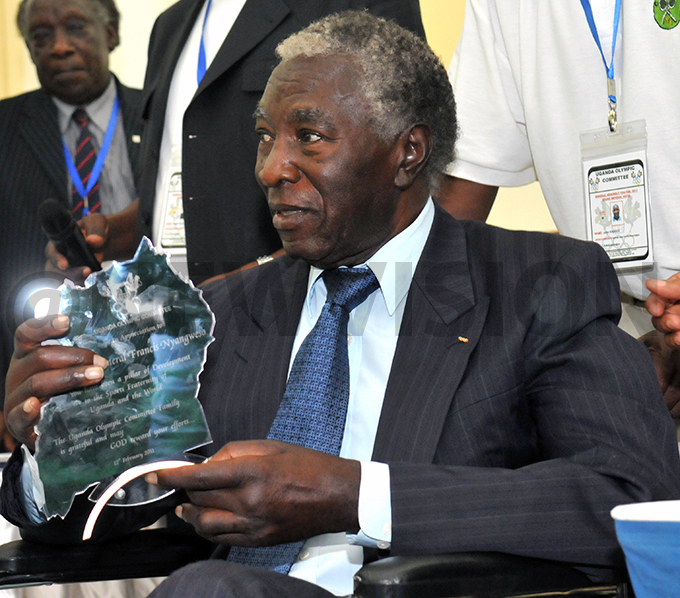 Uganda Olympic Committee (UCO) assembly-rewards Maj.Gen.Nyangweso rewarded in 2011
Uganda Olympic Committee (UCO) assembly-rewards Maj.Gen.Nyangweso rewarded in 2011
As a soldier, Nyangweso rose through the ranks to become an army commander during Idi Amin's regime (1971-79). At one time in 1975, he was de facto president for two weeks, while Amin was on vacation.
It is the same principle he used when after being beaten to the post of the Uganda Olympic Committee president by the then vice president Rogers Ddungu; he said: "I wish you luck".
His early life
Born in the eastern border town of Busia on September 29, 1939, Nyangweso wanted to be successful in life at an early age. This ambition was largely aided by the strong foundation of the disciplining parents, David and Manjeri Were.
Were was working in the forces where discipline was paramount, and even when he was away, he made sure Nyangweso got the best education by putting him in the care of his uncle, who was working at Nsambya Parish.
He attended St Peter's Nsambya Primary School before joining Namilyango College School where he pursued his boxing dream. He also played football, tennis, and volleyball before going on to work as a banker.
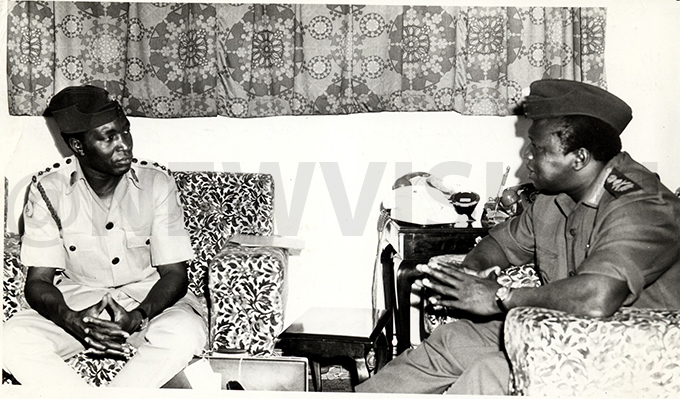 President Amin meeting Col. Nyangweso on August 10, 1972
President Amin meeting Col. Nyangweso on August 10, 1972
His boxing performance saw him become one of Uganda's most accomplished boxers and captain of a national boxing team, the Bombers, between 1958 and 1962, where he won a Hapoel Games gold medal (1961), Commonwealth Games bronze medal in Perth, Australia, (1962) on top of being the East Africa region champion for seven years.
He represented Uganda at the 1960 Rome Olympic Games but missed an opportunity of making his dream of fighting Muhammad Ali come true when he lost in the quarter-finals.
Life in the army
Immediately after completing his secondary education, Nyangweso was one of the first few Ugandans recruited as Infantry cadet officers and sent to Sandhurst Military Academy in the UK for training to become an army officer.
"Other cadets included Tom Agutoko from West Nile, Okech from Acholi and Byarugaba from Western Uganda," said Sam Oduny a former soldier who served with the late general.
Just before Uganda's independence, Nyangweso returned after completing his cadet course, it is during that time that he was commissioned an officer and promoted to the rank of 2nd Lieutenant.
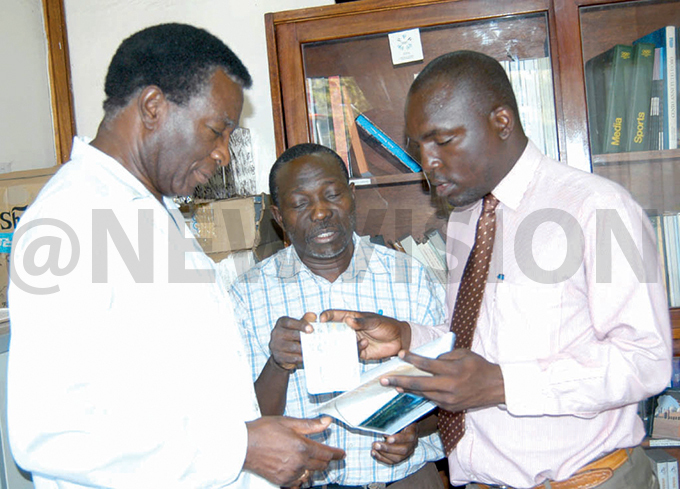 Former USPA secretary and New Vision reporter Norman Katende (R) receives a $1425 air ticket from UOC president Francis Nyangweso (L) as facilitation to the AIPS congress in New York, June 1 2004.
Former USPA secretary and New Vision reporter Norman Katende (R) receives a $1425 air ticket from UOC president Francis Nyangweso (L) as facilitation to the AIPS congress in New York, June 1 2004.
"He became one of few officers, who were in both the King African Rifles and the Uganda Rifles, something that was novelty then," said Oduny.
Adding that Nyangweso was then posted to the Army Headquarters at Jinja as a platoon commander. "By that time Uganda had only one unit of the army situated at Jinja."
In 1964 when Uganda was expanding its battalion, Nyagweso was one of the officers sent to open a unit to Karamoja to quell cattle rustlers. During the mutiny of the Army in 1964 Nyangweso had already become a Captain and in 1965 he was one of the few officers Uganda had during the clash between Uganda and Congo, by then he had attained the rank of major.
In 1971 when Idi Amin overthrew the Government, Nyangweso was promoted to the rank of lieutenant colonel and appointed the first army commander in the Government of Idi Amin. The promotion of Nyangweso during the Amin era was very fast.
He, for instance, made the rank of major general in 1975 and also took up the position of defense minister.
But around that time, it is alleged that Amin's tribe members all wanted to be ministers and he was entertaining it.
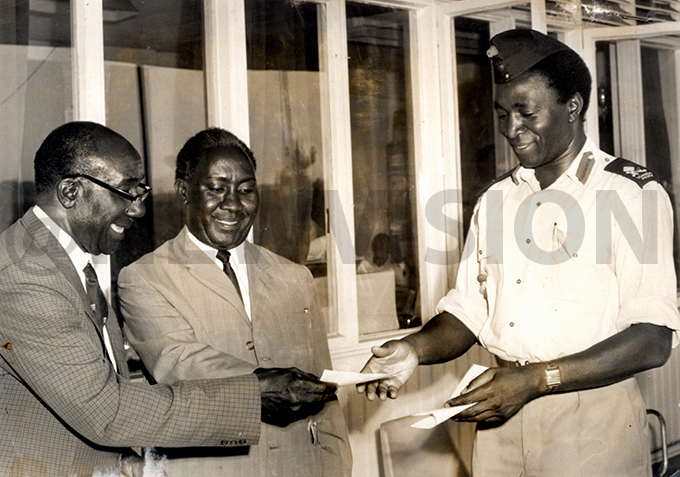 Dr. Samson Kisekka presents a cheque to the National Chairman of International Olympic Committee Maj. Gen. Francis Nyangweso to take the National team to the olympics.
Dr. Samson Kisekka presents a cheque to the National Chairman of International Olympic Committee Maj. Gen. Francis Nyangweso to take the National team to the olympics.
Knocking out Amin
When President Idi Amin came to power, he had noticed Nyangweso's administrative skills and on October 14, 1974, summoned him to State House where he challenged him to a six-round boxing bout. An encounter Nyangweso took on, giving Amin a beating that left the soldiers watching and Nyangweso's wife in shock, fearing for his life.
"We thought that was the end of Nyangweso's life, everybody feared for his life," one of his trainers Thomas Kawere reminded people at the general's burial.
But the fight brought the two men closer earning Nyangweso respect from Amin.
The battle continues
Even when he was out of the army, he continued to conflict with Amin. One time, as a minister, he saw no problem taking on Malcolm Arnold, a British as a national athletics coach.
Amin felt there was no need for a Mzungu to coach Ugandans, but Nyangweso insisted and in the end, Arnold stayed as Uganda's coach and helped Akii Bua win Uganda's only gold medal at the Olympic Games in Munich 1972.
"It is good that the results were seen," he said in an interview with the BBC on a documentary about Akii Bua.
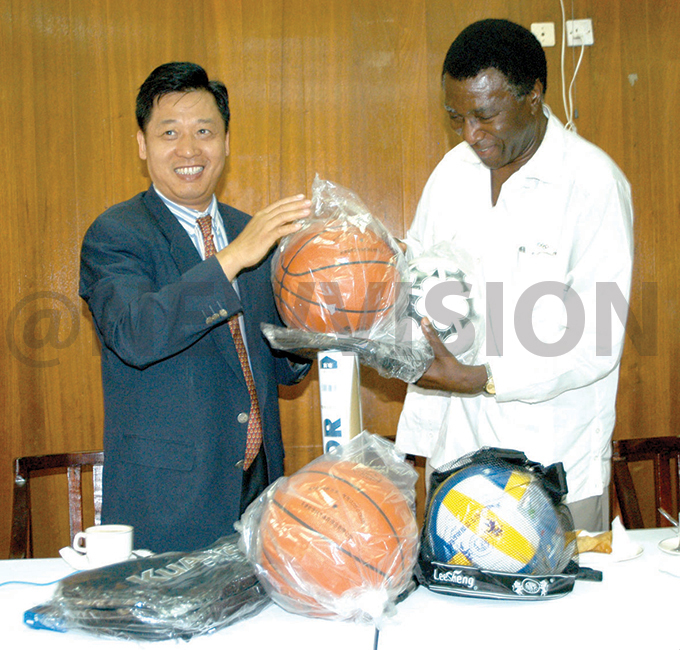 Chinese ambassador to Uganda Li Qiangmin (L) presents sports equipment to UOC president Francis Nyangweso. The donation of 30 boxes of various sports equipment was meant for use as the Ugandan players prepare for the 2004 Olympics in Athens, December 18, 2003.
Chinese ambassador to Uganda Li Qiangmin (L) presents sports equipment to UOC president Francis Nyangweso. The donation of 30 boxes of various sports equipment was meant for use as the Ugandan players prepare for the 2004 Olympics in Athens, December 18, 2003.
As a sports administrator
"It was not an easy path to get to the top. For my first trip, I borrowed money and fed on conference snacks because I had no money.
I had to persevere to reach where I am today," he said of his first trip to the International Olympic Committee (IOC) session as president of the Uganda Olympic Committee. This was the initial step towards his becoming an IOC member.
To him, sports were about the players and not the officials and the only way you would see him angry was by denying the players, mostly the upcoming ones, a chance to compete.
"He was straight and his decisions were based on principle. He never kept a grudge and always supported those ideas that promoted sports," says Beatrice Ayikoru, the secretary-general of the national athletics federation.
"He was also an icon to the sportsmen, respecting his position as a sports administrator," added Ayikoru.
His reign is remembered for the John Mugabi and Davis Kamoga Olympic medals and a revival of athletics.
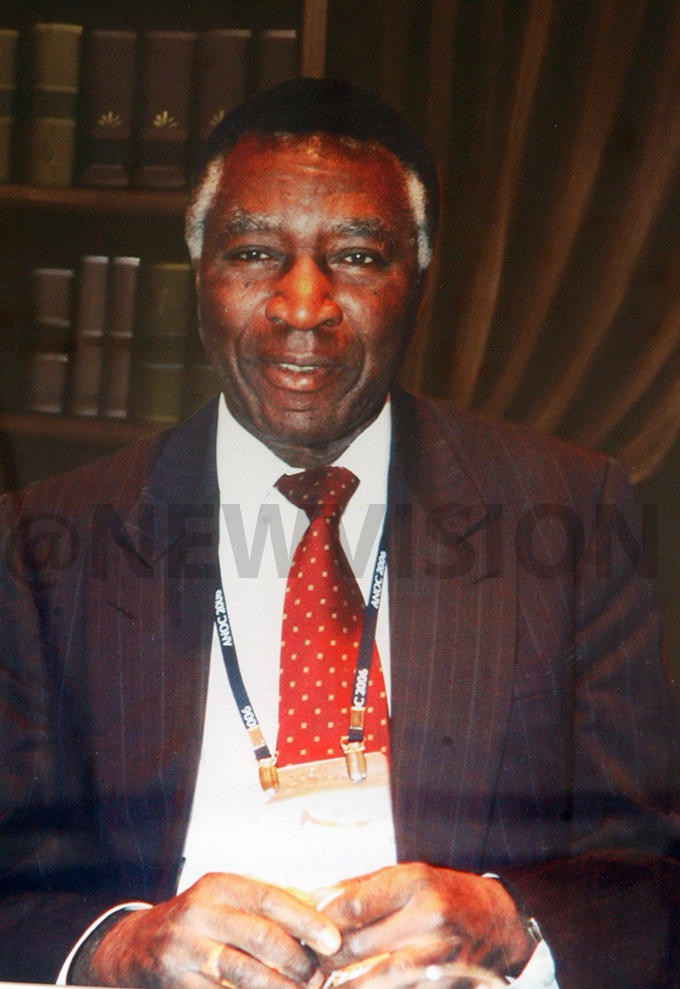
Fatherly figure
Sports are all about performance — and this was the principle that earned him as many friends as enemies.
When the athletics federation was faced with a problem of the Ezra Track Team Board (ETTB) owned by Mike Ezra, he stood by them. ETTB had taken all the top athletes and refused them to take part in different national and international events.
But he smiled at them and said: "Those are not the best; the best have not yet been found, look out for them and concentrate on developing them."
The athletics federation did just that and the Ugandan team won a bronze medal at the World Junior Championships.
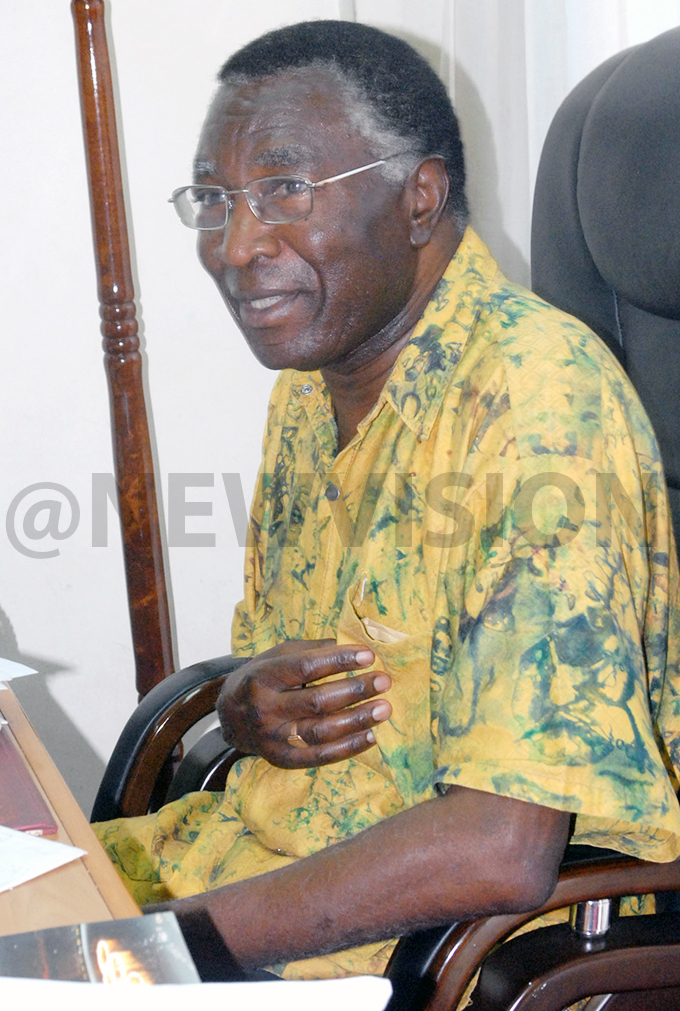
Exit from UOC
Even after developing diabetes which affected his eyesight, Nyangweso still upheld the aspiration to develop sports and maintaining unity.
He believed all the decisions taken were for the good of sports. He always believed the world was a learning process.
When Nyangweso was voted out of the Uganda Olympic Committee he did not conceal its assets "He showed me all the assets that have since been concealed," said Peninah Kabenge.